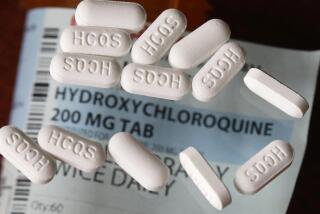Antibiotics Faulted as Heart Treatment
- Share via
Treating heart attack victims with antibiotics does not reduce the risk of having a second heart attack or dying, according to two large trials reported today in the New England Journal of Medicine.
Researchers had hoped the drugs would kill the common bacterium Chlamydia pneumoniae, which was found in arterial plaque in three-quarters of heart attack patients. Its presence had been shown to double the risk of subsequent attacks, and some small studies had suggested that killing it with antibiotics would reduce the risk.
The new results confirmed similar findings in two earlier trials that treated patients for much shorter periods, finding no benefit from using antibiotics. All ongoing studies of antibiotics have been completed.
“The testing of these agents for the treatment of advanced coronary heart disease appears to be at the end of the road,” wrote Dr. Jeffrey L. Anderson of the University of Utah School of Medicine in an editorial in the journal.
Dr. P.K. Shah of Cedars-Sinai Medical Center, who was not involved in the new studies, added: “The body of evidence is now in: that, regardless of whether it is acute coronary disease patients or chronic coronary disease patients, either a short or a long regimen of antibiotics has no impact.”
In the first study, Dr. J. Thomas Grayston of the University of Washington and his colleagues studied 4,012 heart attack patients who were given either azithromycin (trade name Zithromax) or a placebo weekly for one year. At the end of four years, those receiving the antibiotic fared no better than those receiving a placebo but had a slight increase in gastrointestinal disorders.
In the second study, Dr. Christopher P. Cannon of Brigham and Women’s Hospital in Boston and colleagues studied 4,162 patients hospitalized for heart disease. Half were given gatifloxacin (trade name Tequin), an antibiotic thought to be more powerful than azithromycin. The other half were given a placebo for 10 days each month for two years. Researchers observed no benefit from the antibiotic.
The results were a discouraging coda to what had once been considered a promising area of research. Chlamydia pneumoniae -- a close relative of Chlamydia trachomatis, the common sexually transmitted microorganism -- infects more than half of the population at one time or another and causes at least 10% of all cases of pneumonia.
Chlamydia pneumoniae is commonly found in arterial plaque, but rarely in clean arteries. Researchers speculate that it triggers inflammation that damages arteries and contributes to the buildup of clot-forming plaque. Canadian researchers had even shown that injecting proteins from the microbe into mice could produce heart disease.
“We think the biology is true, and the organisms are there in the artery,” Cannon said. “But it is probably one of the early triggers of atherosclerosis, when patients are in their 20s and 30s. Coming in 30 years later with an antibiotic, it’s probably too late to influence that part of the process.”
But Shah, who conducted one of the earlier trials, disagreed. “I think it is equally possible that it is an innocent bystander and not a culprit,” he said. “The biology suggested a plausible link, but the ultimate proof is in the therapeutic trials, and they have all been negative, using three different antibiotics.”
If Cannon and his colleagues are correct, lifetime administration of antibiotics to eradicate the microbe while potential victims are still young is not feasible because of the drugs’ side effects and the risk of developing antibiotic-resistant bacteria, experts said.
Another alternative would be to develop a vaccine to give children to prevent infections.
“But that would be a tricky thing to test,” Cannon said. “We were contemplating it recently and we realized it would be our grandchildren who would be presenting the results.”






